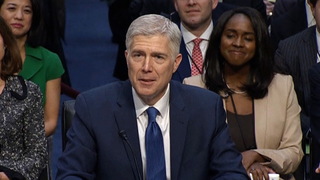
By Amy Goodman & Denis Moynihan
The Senate confirmation hearings for President Donald Trump’s Supreme Court nominee, Neil Gorsuch, have often been obscured by one controversy after another, from the Republican effort to repeal the Affordable Care Act to revelations that the FBI is actively investigating possible links between the Trump campaign and the Russian government. Add to that the unprecedented decision last year by the Senate Republican majority to deny President Barack Obama a hearing on Merrick Garland, his constitutionally nominated successor to the late Supreme Court Justice Antonin Scalia, after Scalia’s death. The magnitude of a Supreme Court nomination should not be underestimated; it comes with a lifetime appointment to the bench, with far-reaching, sometimes life-or-death implications. No one understands that better than Alphonse Maddin.
On a freezing-cold night in January 2009, Alphonse Maddin was driving a truck, employed by TransAm Trucking of Olathe, Kansas. In a statement before the press last week, Maddin recalled his ordeal:
“I was hauling a load of meat through the state of Illinois. After stopping to resolve a discrepancy in the location to refuel, the brakes on the trailer froze. I contacted my employer, and they arranged for a repair unit to come to my location.” Waiting in the freezing cold, Maddin fell asleep.
The African-American trucker went on: “I awoke three hours later to discover that I could not feel my feet, my skin was burning and cracking, my speech was slurred, and I was having trouble breathing. The temperature that night was roughly 27 degrees Fahrenheit below zero. The heater in the cabin was not producing heat, and the temperature gauge in the truck was reading minus 7 degrees below zero. After informing my employer of my physical condition, they responded by telling me to simply hang in there. … I started having thoughts that I was going to die. My physical condition was fading rapidly. I decided to try to detach the trailer from the truck and drive to safety.” He did so, and for taking that action to save his own life, he was fired.
Maddin sued, and the Department of Labor ordered his reinstatement, with back pay. TransAm Trucking appealed, and the case was argued before the federal 10th Circuit Court of Appeals. Among the three judges hearing the case was Neil Gorsuch. Maddin’s attorney, labor lawyer Robert Fetter, recalled:
“There were five or six cases before that court that morning, and we were the last. Judge Gorsuch was neutral, or even affable, as the cases proceeded. Then, when our case came up, he became noticeably hostile. … He was not folksy or oh goshy,” Fetter said, comparing Gorsuch that day with the nominee’s demeanor at this week’s hearings. “It was like night and day.”
Maddin summed up the ordeal and the legal battle that followed, saying: “I disputed my termination from TransAm Trucking and ultimately won. This was a seven-year battle. Seven different judges heard my case. One of those judges found against me. That judge was Neil Gorsuch.”
As Fetter put it, “the business community loved it.” Why is this relevant? Candidate Donald Trump publicized a list of prospective Supreme Court nominees in May 2016. Gorsuch was not on it. Gorsuch’s dissent came out on Aug. 8, extolling what Fetter called Maddin’s “legal right to stay in the truck and freeze to death.” In late September, Trump, by then the Republican nominee, published a second list of Supreme Court nominees, this one included Gorsuch.
Elliot Mincberg, senior fellow at People for the American Way, said on the “Democracy Now!” news hour, “[Gorsuch] did what he does in so many cases, siding with the corporation.”
Sen. Al Franken, D-Minn., during his questioning of Gorsuch Tuesday, said, “I think everybody here would have done exactly what he [Alphonse Maddin] did. … It is absurd to say this company is in its rights to fire him because he made the choice of possibly dying from freezing to death or causing other people to die possibly by driving an unsafe vehicle. That’s absurd.” Franken, formerly a comedian, added, “Now, I had a career in identifying absurdity, and I know it when I see it. And it makes me question your judgment.”
Yes, Neil Gorsuch stands out. Seven judges heard Alphonse Maddin’s case. Six sided with the frozen trucker. Supreme Court decisions are not theoretical; they can have real-world, life-and-death impacts. They reflect our collective values. Neil Gorsuch cast a cold, solitary vote against a worker who was fighting for his life. That should weigh heavily on the senators as they consider Gorsuch’s lifetime appointment to the highest court in the land.












Media Options